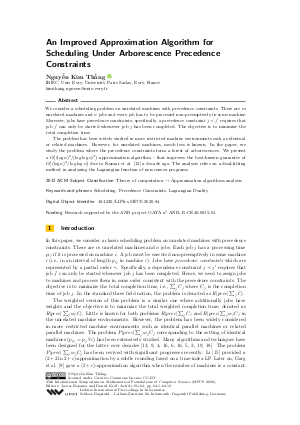An Improved Approximation Algorithm for Scheduling Under Arborescence Precedence Constraints
Author
Nguyễn Kim Thắng 
-
Part of:
Volume:
45th International Symposium on Mathematical Foundations of Computer Science (MFCS 2020)
Part of: Series: Leibniz International Proceedings in Informatics (LIPIcs)
Part of: Conference: Mathematical Foundations of Computer Science (MFCS) - License:
 Creative Commons Attribution 3.0 Unported license
Creative Commons Attribution 3.0 Unported license
- Publication Date: 2020-08-18
File

PDF
LIPIcs.MFCS.2020.84.pdf
- Filesize: 484 kB
- 12 pages
Document Identifiers
Subject Classification
ACM Subject Classification
- Theory of computation → Approximation algorithms analysis
Keywords
- Scheduling
- Precedence Constraints
- Lagrangian Duality
Metrics
- Access Statistics
-
Total Accesses (updated on a weekly basis)
0Document
0Metadata
Abstract
We consider a scheduling problem on unrelated machines with precedence constraints. There are m unrelated machines and n jobs and every job has to be processed non-preemptively in some machine. Moreover, jobs have precedence constraints; specifically, a precedence constraint j ≺ j' requires that job j' can only be started whenever job j has been completed. The objective is to minimize the total completion time. The problem has been widely studied in more restricted machine environments such as identical or related machines. However, for unrelated machines, much less is known. In the paper, we study the problem where the precedence constraints form a forest of arborescences. We present a O((log n)² / (log log n)³)-approximation algorithm - that improves the best-known guarantee of O((log n)² / log log n) due to Kumar et al. a decade ago. The analysis relies on a dual-fitting method in analyzing the Lagrangian function of non-convex programs.
Cite As Get BibTex
Nguyễn Kim Thắng. An Improved Approximation Algorithm for Scheduling Under Arborescence Precedence Constraints. In 45th International Symposium on Mathematical Foundations of Computer Science (MFCS 2020). Leibniz International Proceedings in Informatics (LIPIcs), Volume 170, pp. 84:1-84:12, Schloss Dagstuhl – Leibniz-Zentrum für Informatik (2020)
https://doi.org/10.4230/LIPIcs.MFCS.2020.84
BibTex
@InProceedings{thang:LIPIcs.MFCS.2020.84,
author = {Thắng, Nguy\~{ê}n Kim},
title = {{An Improved Approximation Algorithm for Scheduling Under Arborescence Precedence Constraints}},
booktitle = {45th International Symposium on Mathematical Foundations of Computer Science (MFCS 2020)},
pages = {84:1--84:12},
series = {Leibniz International Proceedings in Informatics (LIPIcs)},
ISBN = {978-3-95977-159-7},
ISSN = {1868-8969},
year = {2020},
volume = {170},
editor = {Esparza, Javier and Kr\'{a}l', Daniel},
publisher = {Schloss Dagstuhl -- Leibniz-Zentrum f{\"u}r Informatik},
address = {Dagstuhl, Germany},
URL = {https://drops.dagstuhl.de/entities/document/10.4230/LIPIcs.MFCS.2020.84},
URN = {urn:nbn:de:0030-drops-127459},
doi = {10.4230/LIPIcs.MFCS.2020.84},
annote = {Keywords: Scheduling, Precedence Constraints, Lagrangian Duality}
}
Author Details
Funding
Research supported by the ANR project OATA nsuperscript{o} ANR-15-CE40-0015-01.
References
-
S. Anand, Naveen Garg, and Amit Kumar. Resource augmentation for weighted flow-time explained by dual fitting. In Proc. 23rd ACM-SIAM Symposium on Discrete Algorithms, pages 1228-1241, 2012.

-
Nikhil Bansal and Subhash Khot. Optimal long code test with one free bit. In Proc. 50th Symposium on Foundations of Computer Science, pages 453-462, 2009.

-
Abbas Bazzi and Ashkan Norouzi-Fard. Towards tight lower bounds for scheduling problems. In Proc. 23rd European Symposium on Algorithms, pages 118-129, 2015.

-
Soumen Chakrabarti, Cynthia A Phillips, Andreas S Schulz, David B Shmoys, Cliff Stein, and Joel Wein. Improved scheduling algorithms for minsum criteria. In Proc. Colloquium on Automata, Languages, and Programming, pages 646-657, 1996.

-
Chandra Chekuri and Sanjeev Khanna. Approximation algorithms for minimizing average weighted completion time. In Handbook of Scheduling, pages 220-249. Chapman and Hall/CRC, 2004.

-
Fabián A Chudak and David B Shmoys. Approximation algorithms for precedence-constrained scheduling problems on parallel machines that run at different speeds. Journal of Algorithms, 30(2):323-343, 1999.

-
Shashwat Garg. Quasi-ptas for scheduling with precedences using lp hierarchies. In Proc. 45th Colloquium on Automata, Languages, and Programming, 2018.

-
Shashwat Garg, Janardhan Kulkarni, and Shi Li. Lift and project algorithms for precedence constrained scheduling to minimize completion time. In Proc. 30th Symposium on Discrete Algorithms, pages 1570-1584, 2019.

-
Ronald L Graham, Eugene L Lawler, Jan Karel Lenstra, and AHG Rinnooy Kan. Optimization and approximation in deterministic sequencing and scheduling: a survey. Annals of Discrete Mathematics, 5:287-326, 1979.

-
Han Hoogeveen, Petra Schuurman, and Gerhard J Woeginger. Non-approximability results for scheduling problems with minsum criteria. INFORMS Journal on Computing, 13(2):157-168, 2001.

-
Klaus Jansen, Roberto Solis-Oba, and Maxim Sviridenko. Makespan minimization in job shops: a polynomial time approximation scheme. In Proc. Symposium on Theory of Computing, volume 99, pages 394-399, 1999.

-
Anil Kumar, Madhav Marathe, Srinivasan Parthasarathy, and Aravind Srinivasan. Scheduling on unrelated machines under tree-like precedence constraints. Algorithmica, 55(1):205-226, 2009.

-
Jan Karel Lenstra and AHG Rinnooy Kan. Complexity of scheduling under precedence constraints. Operations Research, 26(1):22-35, 1978.

-
Elaine Levey and Thomas Rothvoss. A (1+ epsilon)-approximation for makespan scheduling with precedence constraints using lp hierarchies. In Proc. 48th Symposium on Theory of Computing, pages 168-177, 2016.

-
Shi Li. Scheduling to minimize total weighted completion time via time-indexed linear programming relaxations. In Proc. 58th Symposium on Foundations of Computer Science (FOCS), pages 283-294, 2017.

-
Alix Munier, Maurice Queyranne, and Andreas S Schulz. Approximation bounds for a general class of precedence constrained parallel machine scheduling problems. In Proc. Conference on Integer Programming and Combinatorial Optimization, pages 367-382, 1998.

-
David B Shmoys, Clifford Stein, and Joel Wein. Improved approximation algorithms for shop scheduling problems. SIAM Journal on Computing, 23(3):617-632, 1994.

-
Martin Skutella. A 2.542-approximation for precedence constrained single machine scheduling with release dates and total weighted completion time objective. Operations Research Letters, 44(5):676-679, 2016.

-
Ola Svensson. Hardness of precedence constrained scheduling on identical machines. SIAM Journal on Computing, 40(5):1258-1274, 2011.

-
Nguyen Kim Thang. Lagrangian duality in online scheduling with resource augmentation and speed scaling. In Proc. 21st European Symposium on Algorithms, pages 755-766, 2013.

